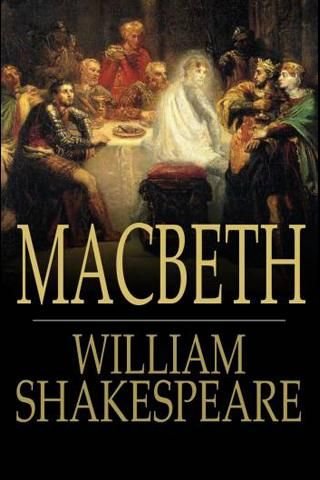Macbeth

Rating: 4.4/5
Author: William Shakespeare
Paperback: 256 pages
Publisher: Penguin; UK ed. edition (29 October 2015)
Language: English
Genre: Drama
ISBN-10: 0141396318
ISBN-13: 978-0141396316
Cost: Rs. 348 (Paperback), Rs. 136 (Hardcover)
Description:
Macbeth is set during the 11th century in Scotland, in the northernmost region of what is now the United Kingdom. At the time the play is set, Scotland was a separate country, although its proximity to England led to many struggles over who would rule the area.
Referred to by superstitious actors as 'the Scottish play', William Shakespeare's Macbeth is a tragedy in which appalling earthly crimes have lasting supernatural repercussions. This Penguin Shakespeare edition is edited by George Hunter with an introduction by Carol Rutter. 'By the pricking of my thumbs, Something wicked this way comes' promised a golden future as ruler of Scotland by three sinister witches, and spurred on by his wife, Macbeth murders King Duncan to ensure his ambitions come true. But he soon learns the meaning of terror - killing once, he must kill again and again, and the dead return to haunt him. A story of war, witchcraft and bloodshed, Macbeth also depicts the relationship between husbands and wives, and the risks they are prepared to take to achieve their desires.
The book contains a general introduction to Shakespeare's life and Elizabethan theatre, a separate introduction to Macbeth, a chronology, suggestions for further reading, an essay discussing performance options on both stage and screen and a commentary.
Review:
The main theme of Macbeth—the destruction wrought when ambition goes unchecked by moral constraints—finds its most powerful expression in the play’s two main characters. Macbeth is a courageous Scottish general who is not naturally inclined to commit evil deeds, yet he deeply desires power and advancement.
Characters in Macbeth frequently dwell on issues of gender. Lady Macbeth manipulates her husband by questioning his manhood, wishes that she herself could be “unsexed,” and does not contradict Macbeth when he says that a woman like her should give birth only to boys.
Macbeth’s true downfall is his own ambition. Lady Macbeth is as ambitious as her husband, encouraging him to commit murder to achieve their goals. Both Macbeths fail to see how their ambition makes them cross moral lines and will lead to their downfall.
Macbeth’s first soliloquy has a strong sense of forward momentum, made possible in part by the lack of line-end punctuation and in part by Shakespeare’s use of alliteration, consonance, and assonance:
“If th’ assassination
Could trammel up the consequence and catch
With his surcease success, that but this blow
Might be the be-all and the end-all here,
But here, upon this bank and shoal of time,
We’d jump the life to come.” (1.7.2–7)
The tone of the play is fatalistic, creating the sense that the natural world has been thrown out of order by Macbeth’s unnatural ascension to the throne. Violence or the possibility of violence exists throughout, and there are very few light or playful moments. The play opens in the aftermath of a bloody battle, and even though the rebels have been defeated, this opening creates an unstable and threatening atmosphere and a tone of justified fear.
The 'reconstructive movement' was concerned with the recreation of Elizabethan acting conditions, and would eventually lead to the creation of Shakespeare's Globe and similar replicas.
One of the movement's offshoots was in the reconstruction of Elizabethan pronunciation: for example Bernard Miles' 1951 Macbeth, for which linguists from University College London were employed to create a transcript of the play in Elizabethan English, then an audio recording of that transcription, from which the actors, in turn, learned their lines.
About the author:
William Shakespeare was born to John Shakespeare and Mary Arden in late April 1564 in Stratford-upon-Avon. He wrote about 38 plays (the precise number is uncertain), many of which are regarded as the most exceptional works of drama ever produced, including Romeo and Juliet (1595), Henry V (1599), Hamlet (1601), Othello (1604), King Lear (1606) and Macbeth (1606), as well as a collection of 154 sonnets, which number among the most profound and influential love poetry in English. In the last phase of his life, he wrote tragicomedies (also known as romances) and collaborated with other playwrights. Many of Shakespeare's plays were published in editions of varying quality and accuracy in his lifetime. Shakespeare died in Stratford in 1616. Throughout the 20th and 21st centuries, Shakespeare's works have been continually adapted and rediscovered by new movements in scholarship and performance. His plays remain popular and are studied, performed, and reinterpreted through various cultural and political contexts around the world.















































